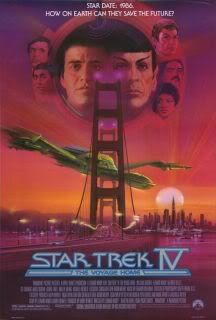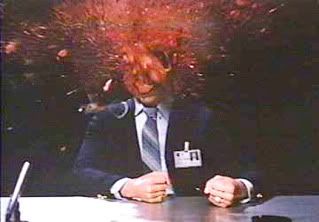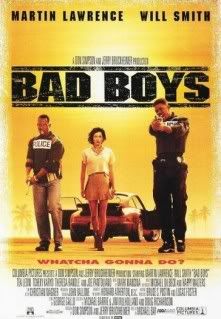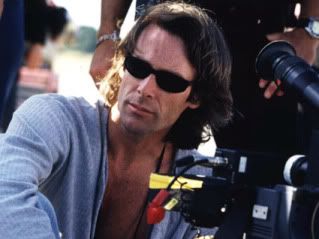 In my critical analysis of Star Trek III: The Search for Spock, I noted that the Star Trek franchise had become a pale shadow of a movie franchise, the last two barely even registering as films. Like a backwoods town attempting to build a restaurant like dem big city folk and ending up with a shack that sells watermelons on Tuesdays. Today we observe Star Trek IV: The Voyage Home, and I have similar things to say about it. The "space epic" thing not working for you? Well, what's popular with the kids? Fish-out-of-water comedies? Great, send the cast back to present day and watch all the wacky hijinks they get into. What will they think of next.
In my critical analysis of Star Trek III: The Search for Spock, I noted that the Star Trek franchise had become a pale shadow of a movie franchise, the last two barely even registering as films. Like a backwoods town attempting to build a restaurant like dem big city folk and ending up with a shack that sells watermelons on Tuesdays. Today we observe Star Trek IV: The Voyage Home, and I have similar things to say about it. The "space epic" thing not working for you? Well, what's popular with the kids? Fish-out-of-water comedies? Great, send the cast back to present day and watch all the wacky hijinks they get into. What will they think of next.Here we go. The plot:
Picking up where Search for Spock left off, Kirk and co. are on Vulcan with the newly reborn Spock, preparing their Klingon vessel (long story) to travel back to Earth and stand trial for Kirk's latest batch of impulsive murders. The preliminary trial (where, in the future, a bunch of dudes stand around in a courtroom talking about how they're going to hang the defendant who isn't even present) features some surprisingly apt discussions of Kirk's anti-Klingon sentiments and desire to kill everything that moves, but presented as the Klingon council's machinations to further their agenda to kill everything that moves. But we're interrupted by the Giant Floating Plot Device that's evaporating Earth's oceans until SOMEONE GETS ME SOME FUCKING WHALES. Naturally, Kirk and co. travel back in time to San Francisco of 1986 (of course you'd say "Ah, San Francisco", Sulu). There, Kirk and Spock plan to abduct some whales from an overprotective marine biologist and do things like not know what money is. Wacky hijinks ensue.
I feel like I'm selling the comedy bit short. Sure, they're all stock jokes that we've heard a million times (Spock can't get the hang of cussing!), but it's nice to watch the cast loosen up a bit. The series has been in desperate need of some pie-throwing for a while, and the cast has an easy chemistry that makes the film pleasant enough to watch.
In fact, the scene where they go to a 20th century hospital allows DeForest Kelley, the funniest member of the original cast, some really great comic moments.
Leonard Nimoy is back in the director's chair for this one, and his helmsmanship has tightened up considerably. The whole film is far breezier and more fun to watch than Search for Spock (although that's not saying much). But this brings up a question: should Star Trek be this breezy? Personally, I don't think it's a good fit. I really got the feeling that the cast was sort of being dragged around haphazardly in this one in a desperate plea to keep the franchise alive. Between the comedy that makes this feel like only a sort-of-a Star Trek movie to the topical message about saving the whales, the producers really pulled out all the stops to try and make this one relevant.
And the cast is beginning to look very, very old. Obviously they've been old for a while now, but I'm just now beginning to see it, especially considering how many of them look like old lesbians (3). It's almost sad to watch. No one would allow a group of septuagenarians a state-of-the-art vessel like this, they're liable to all go into a diabetic coma and crash into the Bob Evans they were flying to.
And let's not forget the marvelously stupid Giant Floating Plot Device. The thing arrives with no explanation. It just shows up and starts evaporating it some oceans until a whale sings at it. Why is it so angry at all water that doesn't house humpback whales? Will the water more effectively house humpback whales when it's been evaporated? What are its origins? Why is any of this shit happening? No one seems especially concerned with this. They make it seem like they do this every week. Some probe comes and starts evaporating their oceans or disintegrating their rain forests until someone goes back in time and gets it the animal du jour. How strange that would seem to an outsider!
I'd rather the president just call Kirk up and send him to San Fransisco of 1986 on a mission to get into wacky hijinks. At least then you're being honest about how lazy you are.
To wrap things up, I'd say that it's nice to see the cast loosen up, but the story needed to be more Trek-esque. Instead it's a fish-out-of-water story about saving whales in 1986 that really doesn't even feel like it belongs in Trek canon. I actually prefer the thematic and visual ambition of Search for Spock, even if that was arguably a bigger failure. This film isn't as much of a failure because it sticks to such a rigid formula.
5/10








